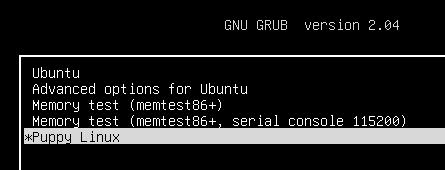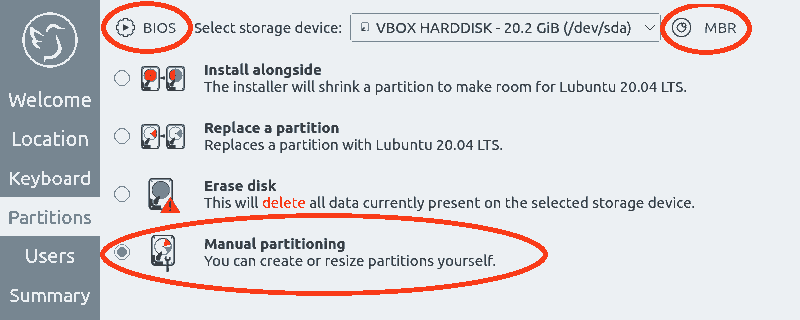Page 1 of 1
Install Puppy on Ubuntu Linux
Posted: Sun Sep 05, 2021 5:27 pm
by shinobar
Best solution is Grub2config. viewtopic.php?f=155&t=3360
If you install Ubuntu Linux or the derivatives and want to install Puppy on the Ubuntu partition, only the solution is Grub2config.
The Grub4Dos does not support recent linux'es ext4 partition with 64bit option. You need Grub2. The FrugalPup uses Grub2, but it does not make dual boot with Ubuntu Linux.
if your PC uses UEFI and you can boot Live Puppy by CD or USB, need not rest of this article.
Only one case the Grub2config does not support: EDIT(2024-09-16) grub2config-2.1 supports this case.
If you clean install Ubuntu Linux on a legacy BIOS PC, the partition sda1 is ext4 formatted, does not support Grub2config nor FrugalPup.
In this case, you can install Puppy manually or using the Universal installer on a live Puppy.
And then make a text file /boot/grub/custom.cfg describes menu entry shown in the next post.
The file /boot/grub/custom.cfg persists as is even the grub updated.
Here I made a script runs on Ubuntu Linux doing this automatically. Next steps on the Ubuntu:
- Download any of Puppy Linux .iso file. Maybe at '/home/USERNAME/Downloads'.
- At the same place of the .iso file, download pupisoinstall .zip.
- Extract the .zip there.
- Run the extracted pupisoinstall on a terminal.
Download pupisoinstall-0.4.zip (2024-07-17: updated)
Boot up Puppy on Ubuntu Linux
Posted: Mon Sep 06, 2021 1:29 am
by shinobar
if you like to manually make /boot/grub/custom.cfg like this:
Code: Select all
set timeout_style=menu
set timeout=10
menuentry 'Puppy Linux' {
set subdir=puppy
search --no-floppy --file --set=root /$subdir/vmlinuz
linux /$subdir/vmlinuz psubdir=$subdir pmedia=atahd pfix=fsck
initrd /$subdir/initrd.gz
}
Where the Puppy is installed in a folder /puppy.
On Ubuntu, make a text file custom.cfg contains above at the users home directory. Then laiunch a virtual terminal and type:
New entry will be shown at the last on the boot menu.

- puppybootmenu.png (4.75 KiB) Viewed 4677 times
Install Ubuntu Linux for multiboot
Posted: Tue Sep 07, 2021 3:47 pm
by shinobar
If you want to clean install Ubuntu Linux and/or derivatives co-operative with Puppy Linux on legacy BIOS PC, read this article.
If your PC uses UEFI, need not this article. See the top article of this topic.
Make the first partition sda1 to be 512MB sized fat32 formatted and flagged 'boot'. Make the 2nd partition sda2 ext4 formatted and install Ubuntu on sda2 (mount point '/').
Ubuntu installer shows the disk status. You can see 'BIOS' and 'MBR' at the top line. Then select 'Manual Partitioning.
If it shows 'UEFI' and 'GPT', Select 'Erase Disk' so that the installer erases all partitions and automatically makes partitions on the disk.

- ubuntuinst1.png (22.99 KiB) Viewed 4572 times
Erase all partitions.
Create 521 size fat32 partition, boot flag.
create the rest ext4 parttion, mount point '/'.

- ubuntuinst9.png (14.23 KiB) Viewed 4572 times
In this partition layout, you can use Grub2config.
Updated: Pupisoinstall-0.4
Posted: Sat Jul 13, 2024 1:52 pm
by shinobar
pupisoinstall-0.4
Frugal install Puppy on Ubuntu Linux
Download: http://shinobar.server-on.net/puppy/opt ... ll-0.4.zip
Do next steps on the Ubuntu:
1. Download any of Puppy Linux .iso file, maybe at '/home/USERNAME/Downloads'.
2. At the same place of the .iso file, download pupisoinstall-0.4.zip.
3. Extract the .zip there.
4. Run the extracted pupisoinstall.bin on a terminal.
Re: Install Puppy on Ubuntu Linux
Posted: Tue Jul 23, 2024 10:39 pm
by tryPuppy
Just wanted to say, ** THANK YOU VERY VERY MUCH!!! ** 
I have a Dual boot sys, Xubuntu/Win 7, & 1st (Xu ) part is Ext4
[for many years used Ext3, 4 limits options & compatibility on many things]
Didn't want it on /Home, (defeats purpose of 2nd OS that can work on other OS) but was able to modify script some to work on another partition.
(been trying to boot ISOs from GRUB boot menu, all kinds of problems! 1 of which, GRUB won't boot any linux from anything except hd0)
I am curious though, formats seem very very similar---can the "custom.cfg" (/boot/grub/) be combined with
" /etc/grub.d/40_custom" where other GRUB boot entries can be added?
is there a way to make the puppy boot from ISO, or does it have to be "installed" 1st?
I've never seen *SO MANY* "distros" /versions of linux in 1 place! LOL!
Re: Install Puppy on Ubuntu Linux
Posted: Tue Jul 23, 2024 11:13 pm
by TerryH
tryPuppy wrote: Tue Jul 23, 2024 10:39 pm
I am curious though, formats seem very very similar---can the "custom.cfg" (/boot/grub/) be combined with
" /etc/grub.d/40_custom" where other GRUB boot entries can be added?
They basically do the same thing in adding boot stanzas to the boot screen. They achieve it in different ways. The 40_custom file is added to the the grub.cfg only by running update-grub / update-grub2, it is not used otherwise. The custom.cfg, if it contains boot stanzas is added to the bottom of the boot screen at time of boot, it does not require the update-grub to be run. so grub2 is configured to use custom.cfg, but not 40_custom directly.
Re: Install Puppy on Ubuntu Linux
Posted: Tue Jul 23, 2024 11:20 pm
by williwaw
tryPuppy wrote: Tue Jul 23, 2024 10:39 pm
is there a way to make the puppy boot from ISO, or does it have to be "installed" 1st?
viewtopic.php?p=93661#p93661
Re: Install Puppy on Ubuntu Linux
Posted: Sat Jul 27, 2024 3:28 pm
by tryPuppy
TerryH wrote: Tue Jul 23, 2024 11:13 pm
tryPuppy wrote: Tue Jul 23, 2024 10:39 pm
I am curious though, formats seem very very similar---can the "custom.cfg" (/boot/grub/) be combined with
" /etc/grub.d/40_custom" where other GRUB boot entries can be added?
They basically do the same thing in adding boot stanzas to the boot screen. They achieve it in different ways. The 40_custom file is added to the the grub.cfg only by running update-grub / update-grub2, it is not used otherwise. The custom.cfg, if it contains boot stanzas is added to the bottom of the boot screen at time of boot, it does not require the update-grub to be run. so grub2 is configured to use custom.cfg, but not 40_custom directly.
Thanks for the info.
Seems im finding, KISS (Keep It Simple Stupid) better to stick to using 1 file instead of 2
"grub-update" runs quick, small price to pay. (not that BOTH files need SUDO permission.
Little things like this are part of what makes GRUB2 confusing for many. (still learning it myself)